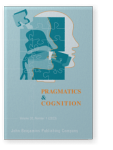Vol. 30:1 (2023) ► pp.1–30
40 years of research into children’s irony comprehension
A review
Children’s ability to understand irony is believed to be acquired late compared to other pragmatic skills. To explore this assertion, this article presents a review of four decades of research, to determine the age at which children actually do become capable of understanding ironic utterances, and what the crucial influencing factors are. As this systematic examination of the state of research shows, children do indeed seem to gain an understanding of irony later than other forms of non-literal language. In seeking an explanation for this finding, this article discusses the methodological orientation of previous research. It might be that the predominant use of offline methods, especially metalinguistic judgment tasks, paints a somewhat distorted picture of children’s irony comprehension. The article therefore argues for the use of eye-tracking, and a re-examination of the thesis of late acquisition of irony comprehension in children in the near future.
Article outline
- 1.Introduction
- 2.Developmental sequence and age of acquisition of irony processing and
comprehension
- 2.1Social-cognitive aspects
- 2.1.1Speaker belief
- 2.1.2Speaker emotion
- 2.1.3Speaker meaning
- 2.1.4Speaker attitude
- 2.1.5Speaker intent
- 2.1.6Speaker motivation
- 2.1.7Interim summary
- 2.2Social-communicative aspects
- 2.2.1Funniness
- 2.2.2Teasing dimension
- 2.1Social-cognitive aspects
- 3.Factors potentially influencing irony processing and comprehension
- 3.1Cognitive abilities of the participants
- 3.1.1Cognitive flexibility
- 3.1.2Inhibitory control
- 3.1.3Language skills
- 3.1.4Theory of mind
- 3.2Personality traits
- 3.2.1Personality traits of the participants
- 3.2.2Personality traits of the speakers
- 3.3Situational and linguistic cues
- 3.3.1Context versus intonation
- 3.3.2Intonation
- 3.3.3Relationship
- 3.1Cognitive abilities of the participants
- 4.Discussion
- 5.Conclusion
- Notes
-
References
For any use beyond this license, please contact the publisher at [email protected].
